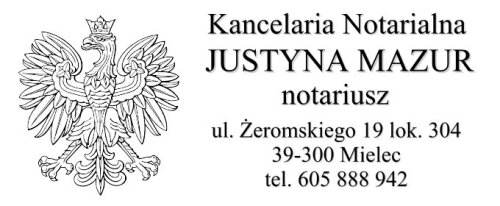Best Estate Planning Lawyers in Poland
Share your needs with us, get contacted by law firms.
Free. Takes 2 min.
Or refine your search by selecting a city:
List of the best lawyers in Poland
About Estate Planning Law in Poland
Estate planning in Poland involves the management and distribution of an individual’s assets upon their death or incapacitation. The goal of estate planning is to ensure that the individual’s wishes are respected and that the transfer of their assets is carried out efficiently and in compliance with Polish law. While Polish inheritance law primarily follows the statutory succession, individuals can also influence the distribution of their assets through wills and other legal arrangements. The legal framework for estate planning in Poland is designed to uphold both the rights of heirs and the testamentary freedom of the individual.
Why You May Need a Lawyer
There are several scenarios where consulting with an estate planning lawyer in Poland is beneficial:
- Drafting a Will: Ensuring that your will is legally sound and reflects your wishes effectively.
- Complicated Family Dynamics: Situations involving blended families, dependents, or business interests that complicate inheritance matters.
- Tax Optimization: Navigating the complexities of taxes on inheritance and gifts to minimize the burden on your heirs.
- International Assets: Cases where assets or heirs are located in different countries, necessitating knowledge of international law.
- Legal Disputes: Resolving any disputes or claims against the estate, including contesting a will.
- Estate Administration: Acting as an executor and needing guidance on executing the will according to Polish law.
Local Laws Overview
The primary legal provisions governing estate planning in Poland include:
- Civil Code Provisions on Succession: These outline the rules for statutory succession, testamentary succession, and the rights of heirs.
- Freedom of Testation: While individuals have the freedom to allocate their estate through a will, certain family members have reserved portions (legitim).
- Inheritance Tax: Poland imposes an inheritance tax; the rate depends on the relationship between the heir and the deceased.
- Execution of Wills: A will must meet specific formal requirements to be valid, including being handwritten, notarized, or made formally before witnesses.
- International Succession Regulations: Poland follows EU Succession Regulation, affecting estates with cross-border elements.
Frequently Asked Questions
What is the legitimacy portion, and who is entitled to it?
The legitimacy portion is a reserved share of the estate that certain close family members are legally entitled to, regardless of the contents of the will. This typically includes children, spouse, and under certain conditions, the parents of the deceased.
Can foreigners draft wills for assets in Poland?
Yes, foreigners can draft wills for assets in Poland. It's advisable to ensure compliance with Polish law or international regulations applicable to the estate.
What happens if there is no will?
If there is no will, the estate is divided according to statutory succession laws. The main heirs are typically the spouse and children, followed by more distant relatives if necessary.
How are disputes over wills resolved in Poland?
Disputes over wills are resolved in Polish civil courts. It is often beneficial to engage a lawyer specializing in inheritance law to navigate and mediate disputes.
Are electronic wills valid in Poland?
Currently, Polish law does not recognize electronic wills as valid. Wills must meet specific requirements, such as being handwritten or notarized.
What is the inheritance tax rate in Poland?
The tax rate varies based on the heir's relationship to the deceased and the value of the inheritance. Immediate family typically benefits from lower rates or exemptions.
Is it mandatory to register a will in Poland?
While not mandatory, registering a will with a notary in Poland can ensure it is more readily accessible after the testator's death.
How can one renounce inheritance in Poland?
An heir wishing to renounce their inheritance must do so formally, often within six months of becoming aware of their eligibility.
What role do notaries play in estate planning?
Notaries authenticate wills, facilitate estate administration, and ensure the legal transfer of property rights according to Polish law.
Can donations inter vivos affect an inheritance?
Yes, donations made during a lifetime can affect the legitimacy portion owed to protected heirs, potentially altering the distribution of the estate.
Additional Resources
For further assistance, consider contacting the following organizations:
- Polish Bar Association: Offers resources and contact information for lawyers specializing in estate planning.
- National Chamber of Notaries: Provides information on notarial services and estate management advice.
- Ministry of Justice of Poland: Offers guidance on inheritance laws and legal proceedings.
- EU Succession Regulation Platforms: For cross-border succession cases, these platforms provide insights and legal advice on international inheritance issues.
Next Steps
If you're seeking legal assistance in estate planning, consider the following steps:
- Determine your primary needs and goals for estate planning.
- Compile a list of assets and any existing testamentary arrangements.
- Research and consult with a qualified estate planning lawyer or notary in Poland.
- Discuss options for wills, trusts, and other estate planning tools with your lawyer.
- Ensure that all documentation complies with Polish law and any international regulations applicable to your circumstances.
By taking these steps, you will be well-positioned to ensure your estate is managed according to your wishes and in compliance with Polish law.
Lawzana helps you find the best lawyers and law firms in Poland through a curated and pre-screened list of qualified legal professionals. Our platform offers rankings and detailed profiles of attorneys and law firms, allowing you to compare based on practice areas, including Estate Planning, experience, and client feedback.
Each profile includes a description of the firm's areas of practice, client reviews, team members and partners, year of establishment, spoken languages, office locations, contact information, social media presence, and any published articles or resources. Most firms on our platform speak English and are experienced in both local and international legal matters.
Get a quote from top-rated law firms in Poland — quickly, securely, and without unnecessary hassle.
Disclaimer:
The information provided on this page is for general informational purposes only and does not constitute legal advice. While we strive to ensure the accuracy and relevance of the content, legal information may change over time, and interpretations of the law can vary. You should always consult with a qualified legal professional for advice specific to your situation.
We disclaim all liability for actions taken or not taken based on the content of this page. If you believe any information is incorrect or outdated, please contact us, and we will review and update it where appropriate.
Browse estate planning law firms by city in Poland
Refine your search by selecting a city.
















